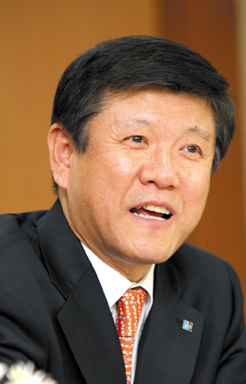On Managing IBK
New Chairman and President Cho intends to clean up malpractices and systems created over last 30 years

"I will clean up various malpractices accumulated in the past three decades at the Industrial Bank of Korea (IBK)," declared President Cho Joon-hee, who took over the helm of the state-run bank barely two months ago.
He has a long way to go to finish his first term as CEO, but changes in the bank can be seen already, particularly in the organization, financial sources said.
As soon as he took office as CEO, he said he would do way with unnecessary promotions and campaigns by the bank as he plans to run the bank with trust and honesty as the basis of his management philosophy.
The new CEO said he has launched a task force to clean up the unnecessary programs and plans being pushed by the bank including the weekly campaign. He said the campaigns held 60 times annually often become useless. The campaign would consequently hurt the bank in the end. He said he feels that securing ways to satisfy customers without such campaigns is the just way, even if it is difficult.
Cho's "just management" even extends to the sale of KIKO financial products. What he would ask first of the staff in charge of selling the financial product is that they know what the product is for sure because a financial product that is not well understood by the bank's staff and customers could be risky to the bank and customers at the same time.
The most difficult thing for management is the management of reputation for the bank, Cho said, adding that he made sure that every operational aspect of the bank such as loans, deposits, risk management and foreign exchange should be taken into account in the evaluation of the performances for personnel and business units.
The CEO said IBK's most important role is to create jobs and support SMEs, since the bank's given roles would not change whether or not it was privatized because its main customers are SMEs.
He said about 30 percent of the bank's funds are being secured through the issuance of bonds while the balance is made up of deposits provided by the consumers to help SMEs. IBK invested 50 billion won in the Korea Credit Guarantee Fund and the Korea Technology Guarantee Fund under a scheme to help SMEs and the two financial instruments extended some 2 trillion won worth of financing, Cho said.
Established under the Industrial Bank of Korea (IBK) Act in 1961, the bank shares a special relationship with the Korean government. The bank's primary objective is to "Promote independent economic activities of small and medium-sized enterprises and to enhance their economic position in the Korean economy." Due to this public policy role, the government retains full control over the bank including the appointment of management and the approval of budget and operational plans of the bank.
On Dec. 11, 2003, an amendment was made to the IBK Act, giving the bank more autonomy in its operations. Among other activities, the bank was allowed to invest in the equities and debt securities of the SMEs and to set up budgeting requirements for general and administrative expenses besides labor costs. An additional amendment was made to the Articles of Incorporation of the Act on March 30, 2005, granting the bank the authority to utilize more diverse sources of capital.
Due to the bank's critical role in implementing SME promotion policies, it receives the highest level of implicit and explicit support from the government. Operations are guaranteed in principle by Article 43 of the IBK Act, which states, "The bank shall cover any net loss incurred during a particular fiscal year with its reserves and if the reserves are insufficient, the government shall provide funds to cover the deficit." As the article stipulates, if the bank's reserves cannot cover the annual net losses incurred during operations, the Korean government is legally obligated to replenish the deficit.
Furthermore, it is the only bank in Korea allowed to issue Small and Medium Industry Finance (SMIF) bonds. SMIF bonds provide the bank with a low cost funding advantage over commercial banks. The aggregate outstanding balance of SMIF bonds can be issued at up to 20 times the bank's paid-in capital plus its reserves. nw
President Cho Joon-hee of Industrial Bank of Korea
- Photo by courtesy of IBK
3Fl, 292-47, Shindang 6-dong, Chung-gu, Seoul, Korea 100-456
Tel : 82-2-2235-6114 / Fax : 82-2-2235-0799